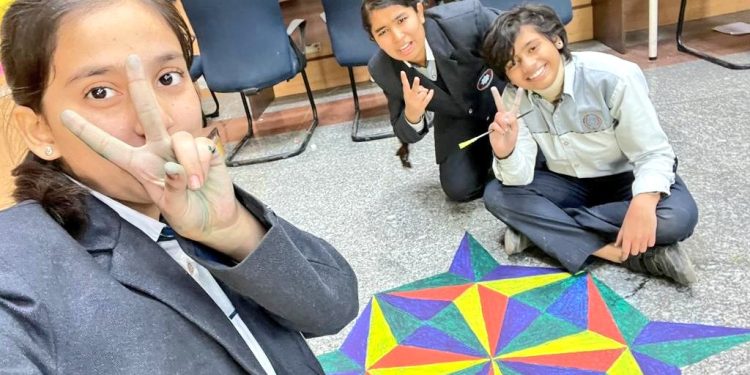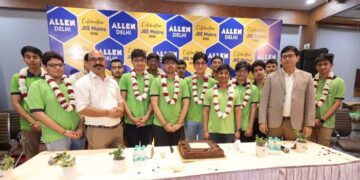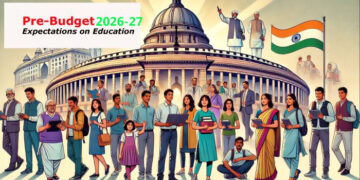One of the key aspects that the EdTech industry is looking forward to being addressed is the need for technological infrastructure in every part of the country. Tier 3 and Tier 4 cities still struggle with online education due to tech-based infrastructure challenges. A lack of good internet speed, digital devices or computer systems stands as a big challenge for online courses. Hence, The EdTech industry is anticipating for the government to make these services accessible for all. Further, the industry’s key demand is lowering GST on online learning and resources for a fair and equivalent system for offline and online education providers.
India holds one of the largest youth population and is yet to be considered the ‘Teaching capital’ of the world. The biggest growth deterrent here is the higher interest rates on education which make it an expensive proposition for students, working professionals, or parents. Hence, legitimate tax benefits will be instrumental in granting applicants with higher rebates and deductions in tax calculations while also making online education a household phenomenon. While NEP 2020 has created several milestones in the last two years, we now need more strategic and targeted actionable to accelerate quality curriculum and vocational skills by academic institutions/HEIs.
“Strengthening of learning infrastructure across non-metros could be pivotal. Indian Edtechs have built strong capabilities to operate at low bandwidth internet which can enhance India’s literacy rate dramatically. We expect the upcoming budget to accelerate wider collaboration with Edtechs to serve a two-pronged purpose: (a) to co-create a curriculum across K12, test-prep, and higher education that stands at par with our global counterparts, and (b) to further scale quality education across levels thereby, also accelerating India’s GER ratio. These developments supported by GOI shall accelerate acceptance of online education while also strengthening India’s stature as the knowledge superpower and Teaching capital of the world.” –Mayank Kumar, Chair at IEC (India EdTech Consortium)
“Technology has the potential to affect the teaching-learning process in the country positively. Our schools need clear direction on how classroom transactions must be constantly redefined and redesigned using technology to make India’s education sector world-class. The digital divide across the country and low levels of digital literacy are two significant barriers to adopting digital technology and the execution of NEP 2020 and NDEAR policies at scale.
For instance, the internet penetration rate in rural areas is approximately one-third that of urban areas. Making the internet freely accessible in rural schools should neutralize inconsistencies around teacher quality, resource availability, and evidence of learning. Moreover, the existing schemes for digital literacy need a significant boost. Under the Pradhan Mantri Gramin Digital Saksharta Abhiyan (PMGDISHA), as of March 2021, only 2.71 crore candidates were certified. For EdTech to deliver on its promise in Bharat, we need parents and teachers who are digitally literate and can facilitate a good learning environment for their children by leveraging technology.” –Shashank Pandey, Co-founder, SwiftChat/ConveGenius
“An increased spending towards digitizing classrooms across government schools in rural areas: Every school should be equipped with smartboards and projectors and our curriculum should further seek to integrate technology across every subject. A special allocation for creating AR/VR labs in every school: This would allow our education to become more “hands-on” and could usher in the much-anticipated era of skills-oriented pedagogy. Also, increase funding for Innovators, developers and startups in the form of grants, mentorship, and access to resources. This will accelerate India’s contribution towards building the foundations of the metaverse and nurturing the development of XR technologies.” –Manav Subodh- Founder of 1M1B ( One Million for One Billion)
“As India stands poised to reach its target of hitting the $5 trillion mark, there is still a sizable quantum of work required to especially bridge the digital divide prevalent in the country. By facilitating deeper penetration of digital literacy and tech-based skilling, the government can ensure greater involvement of women and youth from marginalized and underserved communities to contribute to the economic growth trajectory of India. Additionally, implementing R&D work and promoting collaboration between the government and the social sector will help achieve India’s sustainability goals by 2030. In the year of India’s G20 Presidency, prioritizing women-led entrepreneurial development and building a strong ecosystem for nurturing the youth can help accelerate India to become the world’s third-largest economy.” –Nidhi Bhasin, CEO, Nasscom Foundation
“It been necessary to invest in bridging the skill gaps that have developed due to a lack of in-person learning. Teachers need to be prepared as well. This means investing in professional development and training opportunities that will help us effectively implement blended learning methods in the classroom and utilise the technology-enabled infrastructure. I am advocating for a budget dedicated towards programmes and resources that will help our students & teachers receive extra support and opportunities to succeed.” –Rishabh Khanna, Founder, and CEO of Suraasa
“The government has taken some extensive initiative in skill development and has catered to STEM education macros. However, I would recommend focusing on micro factors as well, like reducing excise duty on lab equipment used in education, and also focusing on reducing GST on kits that are made in India. Additionally, a reduction of GST on STEM courses, content, VR, and AR equipment will ensure that experiential STEM education can be made available to all.” –Ritika Amit Kumar, co-founder, and CEO, of STEM Metaverse
“The Union Budget should prioritise creating an enabling environment for education by focusing on the sector’s digital transformation. While the primary goal of the NEP is to ensure everyone has access to education, it suffers from lack of infrastructure, especially digital, in rural and semi-urban areas. We believe that there should be dedicated funds to assist educational institutions in building and scaling digital infrastructure to become hybrid learning centers. Given that India is one of the world’s youngest and largest countries, hybrid learning is the best way to ensure that quality education reaches every corner of the country.” –Ali Sait, CEO, Tech Avant-Garde
“Formal Educational Institutions, Academies, and EdTech Platforms advocate the removal of GST on any of the educational products and services for ten years. . A more profound Tech-enabled training of teachers or perhaps revitalizing the existing Diksha App to enhance the reach.”— Girish Singhania, CEO of EduBridge
Reduce GST: Monica Malhotra Kandhari, MD, MBD group
“GST on E – Books reduced to 5%. The idea of promotion of E Books is welcome along with a concern, the Input Credit availed for Input, Capital Goods and Input Services are charged at Higher rate, resulting into excess Credit lying in the books which will remains un-adjustable all the times. It is suggested to create a mechanism to make corresponding input chargeable at same rate. Also, The GST on education books are exempt with an idea to promote & make education economical, but on the other hand GST paid for Input, Capital Goods and Input Services are increasing the Cost of manufacturing. It is suggested to create a mechanism to make corresponding input/ input services/Capital goods etc either exempt from GST or start levy the GST on sale of Education Books to enable the manufacturer to claim Input credit.” There is also a demand from Educational Institutions, Academies, and EdTech Platforms for removal of GST on any of the educational products and services for a certain period.
“Budget 2023 should focus on digitisation and internationalisation of education. Concepts like smart classrooms, modern teaching techniques and online education should be at the forefront. The government should allocate more funds and greater support to building public libraries, world class research facilities and vocational training institutions. The government should also allocate a special budget for improving internet connectivity infrastructure and access to affordable 5G devices.” —Rajiv Bansal, Director-Operations, GIIS India












